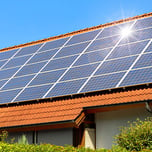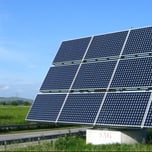
Get up to 4 quotes by filling in only 1 quick form

Slash your energy bills by installing solar panels

We’ve helped over 500,000 homeowners reduce their carbon footprint
- GreenMatch
- Solar Energy
- Solar Panels
- Solar Batteries
Solar Battery Storage System in the UK: All You Need to Know
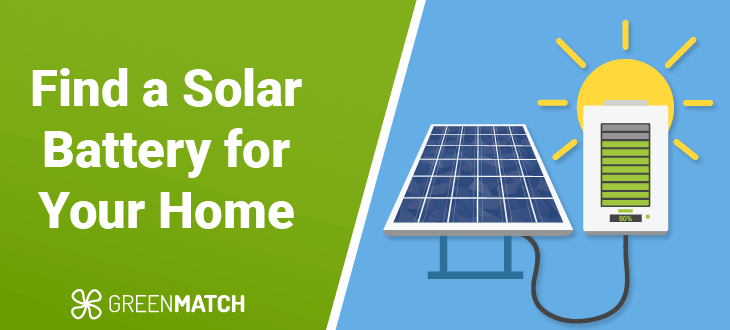
Considering the ongoing demand for energy sustainability, sunshine isn’t just there for picnics and beach days anymore. It’s a potent source of energy waiting to be harnessed too! And a solar battery is a powerful tool to store the sun’s energy both to brighten up your days and store some of it for the UK’s dark nights.
This article will explain the science behind solar batteries and explore the best performers on the market. This way, you can get an idea of the solar battery price for your home.
And for the most informed decision, you’ll need to consult a professional you can trust. However, the process of finding a vetted expert on your own can march on for days and even weeks. You’ll need to sacrifice precious free time for googling, reading reviews, and calling the installers.
Thankfully, GreenMatch is here to save you time. Complete our short form, and we’ll take it from there. We’ll connect you with up to 4 certified solar experts near you who will provide you with free solar quotes.
Compare the quotes with no obligation to accept any of them. Our service is free and takes less than 1 minute to get started. Click the button below to begin!
- Quotes from local engineers
- Payment by finance available
- Save up to £729 per year
It only takes 30 seconds



- What is a solar battery?
- How do solar batteries work?
- Which solar battery types are there?
- What are the pros and cons of solar batteries?
- How much does home battery storage cost?
- Are there grants available for solar batteries for home?
- Solar panel battery storage: What should you consider?
- What size solar battery do I need in the UK?
- Is a solar battery storage system right for my home?
- FAQ
What is a solar battery?
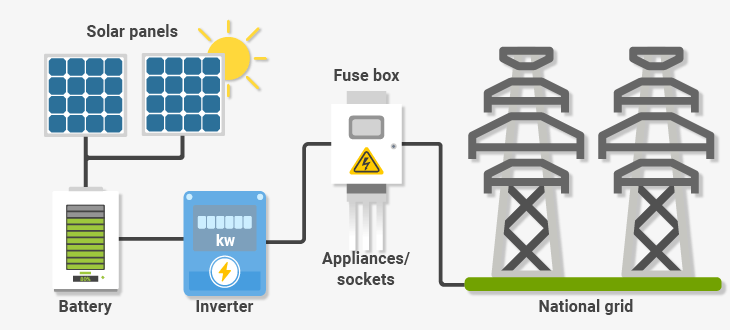
A solar battery is a device that stores the excess electricity generated by your solar panels for later use. They are a great option for homeowners who want to save up solar power and use it at night, when solar panels don’t produce energy.
Usually, this is electricity generated from the sun, making solar batteries a perfect addition to solar panels for your home. However, solar batteries can also store electricity from the grid if need be. You can use this stored energy to power your home or charge an electric vehicle when your solar panels don’t generate enough electricity. This could be during the night or in extreme weather conditions.
Solar battery storage can come in handy during power outages, so you can continue to use your home appliances non-stop without relying on the grid. This means you could potentially upgrade your home by using solar panels for off-grid living!
It’s best to combine the solar panel and solar battery installation. However, if you’re thinking “Can I add batteries to my existing solar panels?” then the answer is “Yes.” Just make sure that your existing solar system is compatible with a battery and its capacity suits your energy consumption.
You can find out more about solar panel batteries in our video guide below:

How do solar batteries work?
First of all, how your solar battery works depends on how your solar panels are wired to your solar battery storage system. This could be either direct current (DC) coupling or alternating current (AC) coupling.
Before we get into the step-by-step process, it’s important to highlight that solar cells create DC electricity while the appliances in your home use AC electricity. Furthermore, solar batteries can only store DC electricity.
This means that the electricity will need to be converted, but at which point it’s converted depends on whether your battery has DC or AC coupling.
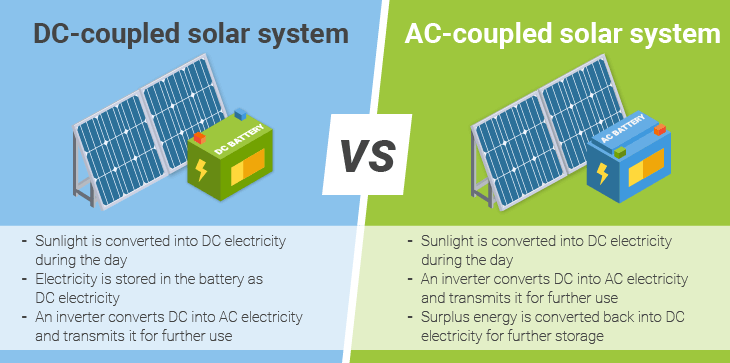
In addition to these steps, it is also possible to convert AC electricity from the grid into DC electricity to be stored in your battery. It’s advisable to do this at night when electricity from the National Grid is typically cheaper.
Depending on your energy supplier, you can also convert your stored DC electricity into AC electricity to be sold back to the grid.
If need be, solar batteries can be used without solar panels. This is usually a go-to plan for homeowners in rural areas with no stable power system or a high chance of blackouts. You can charge your solar battery using the grid electricity and basically turn it into a big power bank. Keep in mind that in this case, the cost-efficiency of your solar battery is questionable and it’s advisable to use a solar battery without from solar panels only in the above-mentioned situations.
There is also the option of having a hybrid inverter, which is a single device that can convert DC electricity into AC electricity and vice versa. Hybrid inverters are growing in popularity as it means you only need one inverter for your home.
When choosing between an AC-coupled or a DC-coupled battery storage system for your home, there are two important things to consider.
The DC-coupled system is typically more efficient due to the fact the energy goes through an inverter less often. However, DC-coupled systems are also more complex to install, making the initial costs of an AC-coupled system usually cheaper.
If you’re unsure which system to pick, you’ll need an opinion from a trusted solar installer. Instead of enjoying time with your family, you can end up spending hours in front of your computer reading installer reviews and reaching out to them. However, such independent searches can’t boast high chances of finding an experienced professional.
Say goodbye to the hassle of endless research and let us simplify the process for you. Fill out our 30-second form to get up to 4 free, no-obligation quotes from local solar installers. Compare the prices with no obligation to place any orders. Click below to get started.
- Quotes from local engineers
- Payment by finance available
- Save up to £729 per year
It only takes 30 seconds



Which solar battery types are there?
As well as deciding whether you want an AC-coupled or a DC-coupled solar battery, you also need to consider the type of battery chemistry. Below we’ll break down each of the solar battery types to help you decide which is best for your personal situation.
Lithium-ion solar batteries
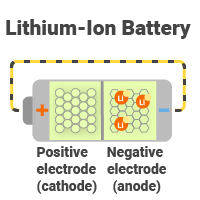
Lithium-ion batteries are currently the most popular type of solar batteries on the UK market. PV battery storage options like the Tesla Powerwall in the UK use this form as their choice of solar battery. It’s also the same technology that’s being used in your smartphone.
They are generally the most expensive solar battery type, however, the price is justifiable. They are considered to be the most efficient battery type, have the longest battery life, and also have a higher usable capacity as they can easily handle discharges of 80% or more.
One factor to be mindful of, however, is that if they are not installed properly, they can pose a fire hazard. This is why it’s so important to contact a qualified installer so you can rest assured that your solar battery is functioning properly and safely.
Lead-acid solar batteries
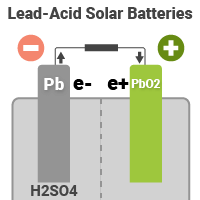
Lead-acid batteries are the oldest and cheapest type of available battery. As battery technology is improving, lead-acid batteries are being replaced by other types of batteries with longer warranties. However, they are still a viable option for many homeowners.
They consist of lead plates immersed within an electrolyte solution containing sulfuric acid. As the battery charges, a chemical process transforms electrical energy into chemical potential, ready for storage. During discharge, however, the accumulated chemical potential makes its voltaic comeback, converting it into electrical energy once again.
While being the most economical choice among various types, lead-acid batteries do come with a comparatively shorter overall lifespan, a lower depth of discharge, and the necessity for frequent check-ups due to the potential release of hydrogen gas during operation.
Solar experts advise against allowing lead-acid batteries to go below a 50% depth of discharge to ensure they last longer.
Lithium iron phosphate battery
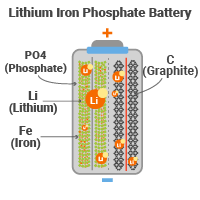
Lithium iron phosphate (LiFePO4) batteries belong to the lithium-ion battery family and employ lithium iron phosphate as the cathode material to hold lithium ions.
During charging, lithium ions (Li+) are liberated from the cathode and traverse the electrolyte to reach the anode. Discharge entails the movement of lithium ions from the anode to the cathode, consequently releasing energy.
LiFePO4 batteries are esteemed for their heightened energy density, compact form, and extended lifespan. They’re also recognised for their safety benefits over other lithium-ion counterparts, attributed to their reduced susceptibility to overheating and thermal runaway.
Moreover, LiFePO4 batteries exhibit better tolerance to temperature ranges but need a battery management system to guarantee proper charging and discharging.
Nickel-cadmium battery
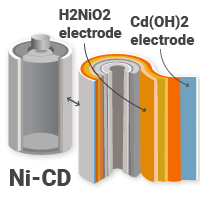
Nickel-cadmium (Ni-Cd) batteries represent a form of rechargeable battery employing nickel oxide hydroxide and metallic cadmium electrodes within a potassium hydroxide alkaline electrolyte.
Ni-Cd batteries boast an extended cycle life, allowing for multiple charge and discharge cycles with minimal capacity loss. Historically, they found widespread use in applications like portable power tools, photography equipment, flashlights, and emergency lighting.
Additionally, they exhibit a low self-discharge rate, enabling them to maintain their charge over prolonged periods of inactivity. However, they are susceptible to the memory effect – incomplete discharge before recharging can lead to gradual capacity decline over time.
Flow battery
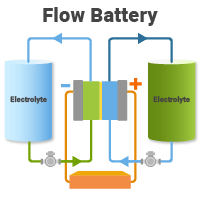
A flow battery, also recognised as a redox flow battery, is a newer PV battery storage. It represents a type of rechargeable battery that functions by employing two chemical components dissolved within flowing liquids, divided by a membrane within the system.
Flow batteries offer a suite of advantages including prolonged cycle life, scalability, and the capacity to stockpile substantial energy reserves. These batteries can be used as renewable energy storage, grid stabilisation, and backup power solutions.
The dynamics of flow batteries revolve around the orchestrated flow of two electrolyte solutions through an electrochemical chamber, catalysing chemical reactions that facilitate energy storage and release. Their hallmark lies in adaptability, making them apt for a variety of energy storage needs.
What are the pros and cons of solar batteries?
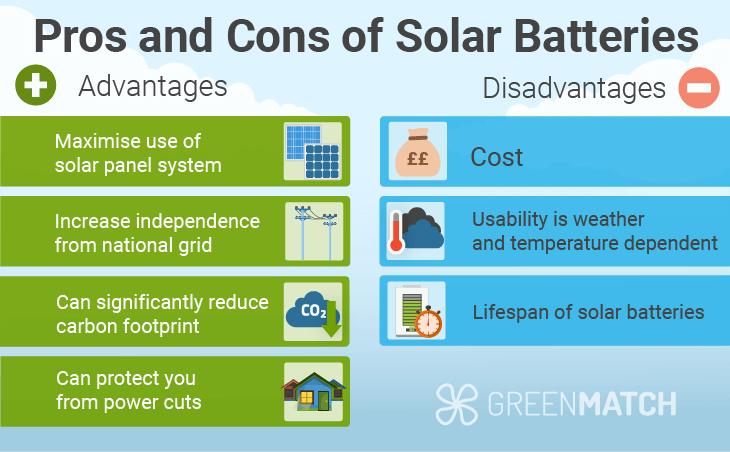
Solar batteries offer a host of advantages, such as energy independence. By allowing you to store surplus energy generated by your solar panels, solar batteries provide a reliable power source even when the sun takes a break.
Reduced energy bills are another benefit of solar batteries. So, if you were wondering: “Do solar panels increase home value when paired with a solar battery?” the answer is “Yes”! What is more, they cut down on carbon emissions, contributing to a cleaner, greener, and more sustainable energy system.
However, the upfront cost can be quite hefty, as you’ll need to invest in the solar battery storage system and its installation. Solar batteries can only store a limited amount of energy, which may not be sufficient for power-hungry households or extended periods with little sunlight.
If you’re unsure how solar battery storage will benefit your home, consulting a solar professional is a must.
Most homeowners will spend hours researching which installers service their area, tediously calling up several of these local installers and then individually requesting comparison quotes. But we know that no one wants to spend their time doing this.
The easy (and fast!) way to get multiple quotes that you can compare is by filling in a 30-second form once and then letting us take it from there.
In return, you get up to 4 free quotes from local installers in our trusted network that you can compare to find the best price. No hassle and no obligation to accept any quotes. Just click the button below to get started.
- Quotes from local engineers
- Payment by finance available
- Save up to £729 per year
It only takes 30 seconds



How much does home battery storage cost?
Currently, most popular solar batteries cost between £4,700 and £14,800. These prices vary widely due to factors such as differences in capacity, battery type, and chemical composite. You can learn more about prices and these criteria from our picks for the best battery for solar panels.
Despite the fact that there have been some fluctuations in cost, the overall trend of solar battery prices is decreasing. This is a similar situation to when photovoltaic systems were new.
As technology improves and solar batteries increase in popularity, the costs will naturally decline. Therefore, these current prices are predicted to decrease further.
Below is a table of some of the most popular batteries available on the market with an estimation of what they cost in 2024:
| Solar Battery | Usable Capacity (kWh) | Approx. Cost (excl. Installation) |
|---|---|---|
| Tesla Powerwall 2 | 13.5 | £5,400 |
| Powervault 3 | 4.1 – 20.5 | £4,700 – £14,800 |
| LG Chem Resu 10H | 9.3 | £5,100 |
| Enphase Encharge 10T | 10.08 | £7,990 |
| Duracell Energy Bank | 3.3 | £4,499 |
| Varta Pulse 3 and 6 | 3.3 – 6.5 | £3,950 – £5,350 |
Even though the initial price of batteries for solar panels can be high, a plus is that they require little to no maintenance, so you don’t have to worry about any potential future costs.
The prices in the table above are simply an estimation and don’t take installation costs or potential solar inverter costs into account. Installation costs can vary depending on factors such as the size of your battery and whether it’s AC- or DC-coupled.
Setting up your solar battery storage system together with your solar panels has a positive impact on the total cost to install solar panels and a solar battery.
The prices of solar batteries vary based on multiple factors, including the brand. For example, if you’re curious how much a 10kW solar battery would cost you, you’ll need to decide on its chemical composition and manufacturer first.
Typically, a 10kW solar battery in the UK is expected to cost around £5,000 but you will also need to factor in labour and installation costs.
This is when a professional installer could weigh in. They can offer you up-to-date information regarding solar battery prices and the costs of their installation services. This way, you can rest assured that you are not overspending on your new solar battery storage system.
You can click the button below to compare quotes from up to 4 solar installers in your area. With our simple form, it only takes 30 seconds to request free, no-obligation quotes to find the best deal for your home.
- Quotes from local engineers
- Payment by finance available
- Save up to £729 per year
It only takes 30 seconds



Are there grants available for solar batteries for home?
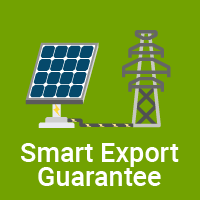
Furthermore, for those of you who want to make some extra money, in the UK it’s possible to sell your solar battery’s stored surplus energy back to the grid through the Smart Export Guarantee (SEG).
You can qualify based on your income and additional considerations, including property age and condition.
Consider talking to a professional solar engineer to check whether you qualify for this grant.
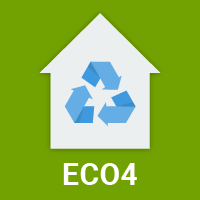
The Energy Company Obligation (ECO4) scheme provides funding for energy efficiency improvements, including solar panels and battery storage, for eligible homeowners in England, Scotland, and Wales. Read more about this in our ‘free solar panels in Wales‘ guide.
ECO4 is accessible to homeowners possessing solar panels of up to 5MW capacity, granted that a smart meter is installed in the property.
At GreenMatch, we have a large network of qualified solar panel installers across the UK. This means we can easily connect you with up to 4 professional installers in your area so that you can easily compare their prices and choose the best solar panels for your home.
If you want to avoid wasting time and money on overpriced installation companies, then fill in our 30-second form and receive up to 4 free quotes. Our service is completely free and non-binding, so what are you waiting for? Click the button below to find the best solar panels for your home.
- Quotes from local engineers
- Payment by finance available
- Save up to £729 per year
It only takes 30 seconds



Solar panel battery storage: What should you consider?
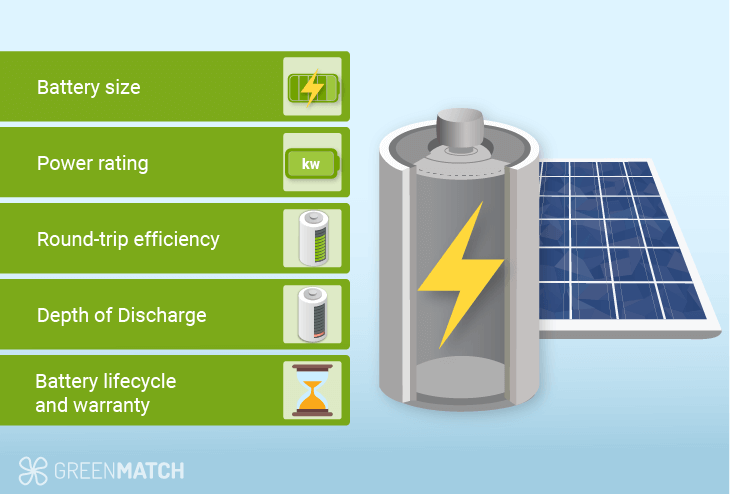
Before you compare the specs of various solar batteries, it’s important to understand which specs you should pay close attention to and what exactly they all mean.
Battery size. A battery’s capacity size is the amount of electricity a battery is able to store. Battery size is measured in kilowatt-hours (kWh), therefore, it expresses how long a battery will be able to power your home.
In particular, you should look out for a battery’s “usable capacity”, as this tells you how much of the stored electricity you can actually access.
Power rating. A battery’s power rating is expressed in kilowatts (kW) and tells you how many and what types of appliances you can power at once.
Round-trip efficiency. As mentioned earlier, you can lose energy by converting it from DC to AC electricity and back. Therefore, round-trip efficiency measures how well your battery and inverter convert and store electricity. It specifically tells you the percentage of energy put into the storage that can be retrieved again.
Depth of Discharge (DoD). Over time as batteries are used they lose their ability to hold charge. DoD is a calculation of the remaining charge hold.
This means that the full energy storage capacity the battery has at purchase will deplete over years of use. Therefore, when buying a solar battery it’s generally better to buy a battery with a higher DoD.
Battery life-cycle and warranty. A battery’s life-cycle measures the number of times you can charge and discharge a battery before it loses performance. In regards to the warranty, some manufacturers, like Tesla, provide an unlimited cycle guarantee, however, most give a figure which can range from 1,800 to 10,000 cycles.
What size solar battery do I need in the UK?
The appropriate size of solar battery storage in the UK depends on multiple considerations like energy consumption, backup duration, usage patterns, space availability, and budget.
Most UK households consume approximately 8.5 to 10 kWh of electricity each day. Thus, a solar battery with a 10 kWh capacity is generally deemed suitable to fulfil their home battery storage requirements.
Engaging with a professional solar installer is advisable, as they can analyse your energy usage, space availability, and other pertinent factors to provide tailored guidance on the optimal size for your solar battery.
Is a solar battery storage system right for my home?
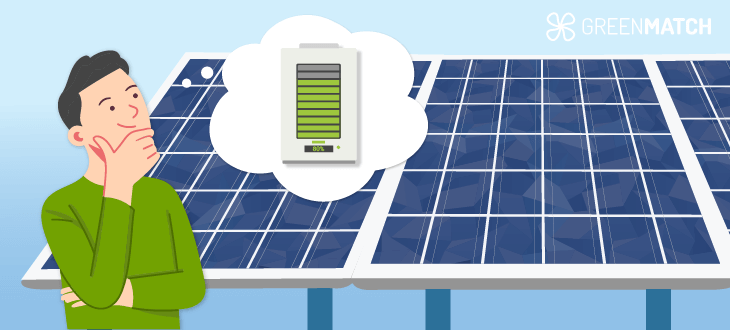
When deciding on the suitability of a solar battery for your home, it’s crucial to assess its advantages and disadvantages. In the end, the choice to incorporate solar battery storage in the UK relies on your location and climate, individual energy requirements, financial constraints, and the space at your disposal.
When deciding on a solar battery installation, key factors include capacity (storage amount), efficiency (usable energy), depth of discharge (usable capacity), warranty, initial cost, maintenance, space requirements, location, battery life, and energy needs. By keeping these factors in mind, you can find the best solar battery for your personal needs.
Seeking advice from a professional installer, capable of evaluating your circumstances and offering tailored guidance, could prove advantageous.
You can search for installers and collect the information yourself, but how time-consuming and stressful would that be? Would you know if the installer you spent hours looking for was certified and had all the necessary expertise?
Thankfully, GreenMatch can do the legwork for you. Fill out our 30-second form to obtain up to 4 quotes from our extensive network of vetted solar panel installers. No hidden fees or obligations to accept any offers. Simply click the button below to receive free quotes to compare.
- Quotes from local engineers
- Payment by finance available
- Save up to £729 per year
It only takes 30 seconds



FAQ

Brontë is an experienced writer and editor for GreenMatch. Her passion for sustainability and renewable energy drives her to stay at the forefront of green-energy trends.
 We strive to connect our customers with the right product and supplier. Would you like to be part of GreenMatch?
We strive to connect our customers with the right product and supplier. Would you like to be part of GreenMatch? - What is a solar battery?
- How do solar batteries work?
- Which solar battery types are there?
- What are the pros and cons of solar batteries?
- How much does home battery storage cost?
- Are there grants available for solar batteries for home?
- Solar panel battery storage: What should you consider?
- What size solar battery do I need in the UK?
- Is a solar battery storage system right for my home?
- FAQ


